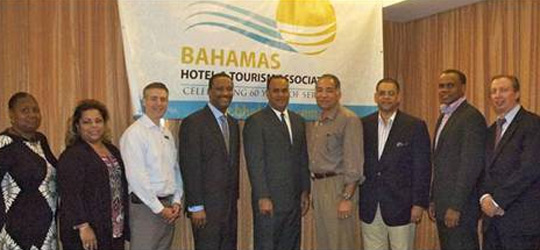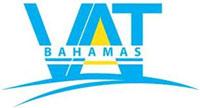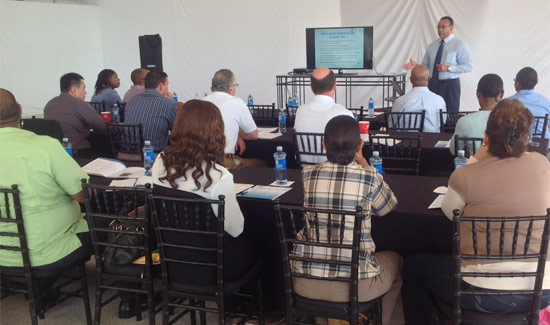BHTA Task Force Continues to Frame Industry Issues and Initial Recommendations

Michael Halkitis, Minister of State for the Ministry of Finance engaged members in a discussion on the proposed Value Added Taxation scheme at Bahamas Hotel & Tourism Association’s (BHTA) April 4th membership meeting. Members raised a number of questions and concerns, many which are being considered by BHTA’s recently formed Tourism Tax Reform Task Force.
The task force presented its initial questions and concerns to the Ministry at a joint meeting last month with the Financial Secretary and members of the Government’s VAT consultation group.
Both the Minister and BHTA President Stuart Bowe pledged to work together to conduct the necessary industry-related analysis, consider impact and recommendations, and support awareness and training within the sector. Financial Secretary John Rolle indicated the Government welcomed this proactive role.
The Minister indicated that the Government’s White Paper issued last month and immediately shared with members is intended as a starting point for discussion. He also pointed out that the proposal is based upon several years of research and looking at comparative jurisdictions which have implemented VAT.
The new taxation scheme is intended to broaden the Government’s revenue base by taxing service businesses, while reducing customs duties and excise taxes. The Bahamas needs to reduce its duty-excise tax rates in order to comply with World Trade Organization requirements.
The Government is proposing several adjustments to the 15%, recognizing the competitive and cost issues the hotel sector experiences. A 10% VAT would replace the room tax while food and beverage in hotels would also be assessed at 10%. This practice has been put in place in several other tourism-dominant economies.
He also stressed that VAT can free up working capital, with the tax being paid at the point of a transaction and not before the transaction as occurs with duties/excise taxes.
BHTA has stressed the critical importance that any new taxation scheme does not increase the already high cost of doing business for hotels and tourism-related businesses and should in fact be cost neutral. Pricing, because of the comparative high costs of doing business versus most competitive destinations, already is a major challenge for the tourism industry.
Adding to that would have a corresponding impact on our competitiveness and ultimately negatively impact Government revenue.
The Government is proposing a July 1, 2014 implementation date, which presents some initial concerns to BHTA. The private sector needs sufficient time to analyze the details of what is being proposed and that cannot be done until the Government provides details on the proposed duty reductions, items eligible for credits, and timelines.
Following are key points of discussion raised thus far with Government:
Phasing Down of Customs Duties
· Duty Rates and Phase-Down Schedule
In response to this question, Government representatives indicated this is yet to be determined. They indicated they hoped to have it finalized as a proposal to present to Cabinet this June to afterwards present to the public. BHTA reps raised concerns about this and the need for sufficient time by the private sector to review, analyze and provide Government with feedback on the proposed schedule reductions and more importantly to be able to plan business 2014 budgets accordingly.
· Transparency and Compliance Matters Related to Price Adjustments
BHTA reps indicated that while market forces will largely dictate that prices by importers and wholesalers will adjust downward to reflect duty reductions factored with their VAT costs, there may be some challenges with ensuring such adjustments take place across the board. Small hotels and businesses will likely be subject to this moreso than large purchasers who may purchase direct and also are able to better manage their wholesaler arrangements.
· Treatment of Wine and Alcohol Products
Given the high current excise tax rates on alcohol products, there needs to be a greater understanding of what is being proposed to assess its impact.
Proposed Rate
· VAT 10% on Food and Beverages
BHTA questioned whether it is applicable to all restaurants or just those in hotels. BHTA also raised concerns about the perception raised by having a 10% VAT plus a mandatory 15% gratuity on a customer’s bill. The idea of being allowed to incorporate the VAT on F&B into the menu prices posted to avoid that perception was advanced with some initial receptivity by the Government representatives.
· 10% on Hotel Room Charge
Industry indicated there needs resolution as to whether this applies to room charge only or also would be applied to energy surcharge, gratuities, and room levy, which industry felt would not be appropriate.
· Contracted Groups Prior to Implementation
Industry reported that already groups are being booked beyond the proposed July, 2014 implementation date with contracted room, F&B and other rates inclusive of taxes based upon the current scheme. This applies to hotels as well as tour operators and would need to be considered.
· Other Areas Needing Consideration
Rate applicability for complimentary rooms for charities, FAM and press trips; ground transportation operator concerns, VAT applicability to casino winnings, long-term marina slip rentals, all-inclusive hotels, and clarity on what services would be subject to VAT.
Implementation Timeline
BHTA representatives expressed concern about the proposed July 2014 implementation date, indicating that FY 2014 budget planning begins this summer for larger companies and for most companies is completed by late October for the following year. Not having sufficient time to analyze the details of what is proposed presents a planning challenge for businesses. It is necessary to know duty schedules and rate adjustment timelines, VAT applicability on various goods and services, and allowable VAT credit arrangements to conduct a proper analysis.
Credit Arrangement
Industry expressed a need for clarity to determine how the credit arrangement works and eligible items i.e. electricity, marketing costs, room amenities, etc?
Proposed $50,000 Exemption Threshold and Special Circumstances for Small Hotels and Businesses, Particularly in Family Islands.
It was pointed out that consideration should be given to the challenges which will be encountered by small hotels and businesses, particularly in the Family Islands. It was pointed out that they will have added purchase costs, typically with a layer of wholesaler costs; shipping to islands, and increased bookkeeping and accounting costs, where availability of such services are limited on most Family Islands.
Adjustments to the threshold level or a delay in implementation for small businesses may be options to consider.
Impact on Investment Incentive Policies
Questions were raised about the impact on the Hotels Encouragement Act, Family Islands Development Act, Downtown Nassau Revitalization Act and what investment incentive scheme might take the place of the present duty-exemption incentives.
Implementation and Administration
Questions have been raised about the readiness of the Government in such a short timeframe to administer and enforce the new regime and also adequately prepare the private sector.
Private Sector Training and Awareness
BHTA representatives stressed the importance of preparing the private sector to support VAT’s implementation. While the private sector can assist with this process, they indicated there will be a need for training resources to be provided by the Ministry, perhaps with support from the IMF and/or IDB.
In addition to providing information on the VAT system itself, it will require attention to training and installation of new software, point of sale systems, bookkeeping, accounting and auditing, etc.
Through its Tourism Tax Reform Task Force, BHTA will undertake to conduct a detailed analysis of the cost implications for the industry, developing models for a large resort, small hotel, restaurant, attraction, wholesaler and ground tour operator.
These models would show the current level of taxation and cost impact for various line items and input areas and then layer that into a scenario with the proposed VAT rates, against a new duty schedule, then factor in credits to determine the true cost impact.
President Bowe indicated that the task force will begin that process, but could not complete it until there is a clear understanding of what the Government is proposing in detail regarding VAT, duty reductions, and allowable credits.
In addition to the issues which BHTA has already raised, members are urged to review the white paper and should they have additional questions or concerns to please forward them to BHTA so they can be considered by the task force.



